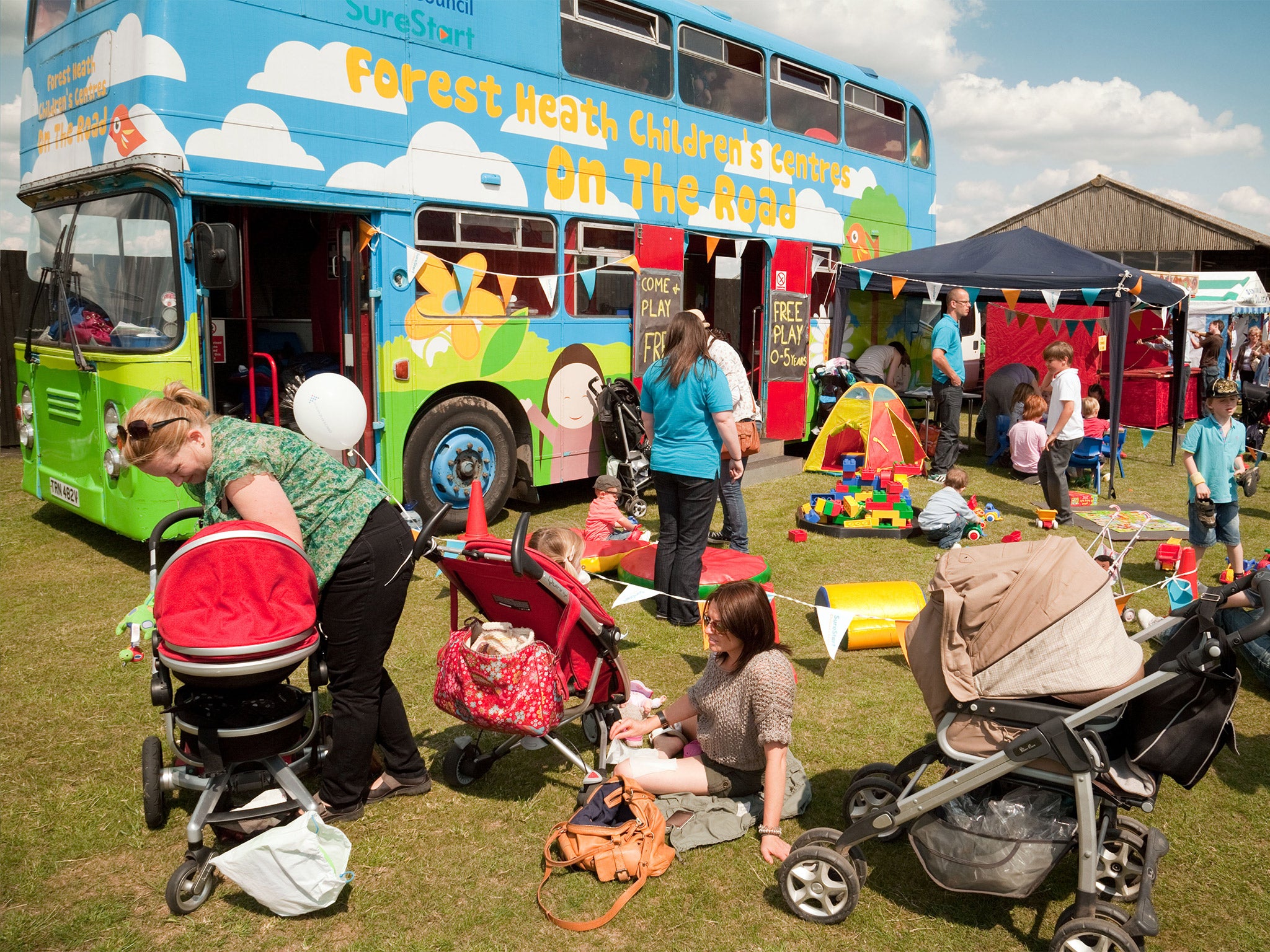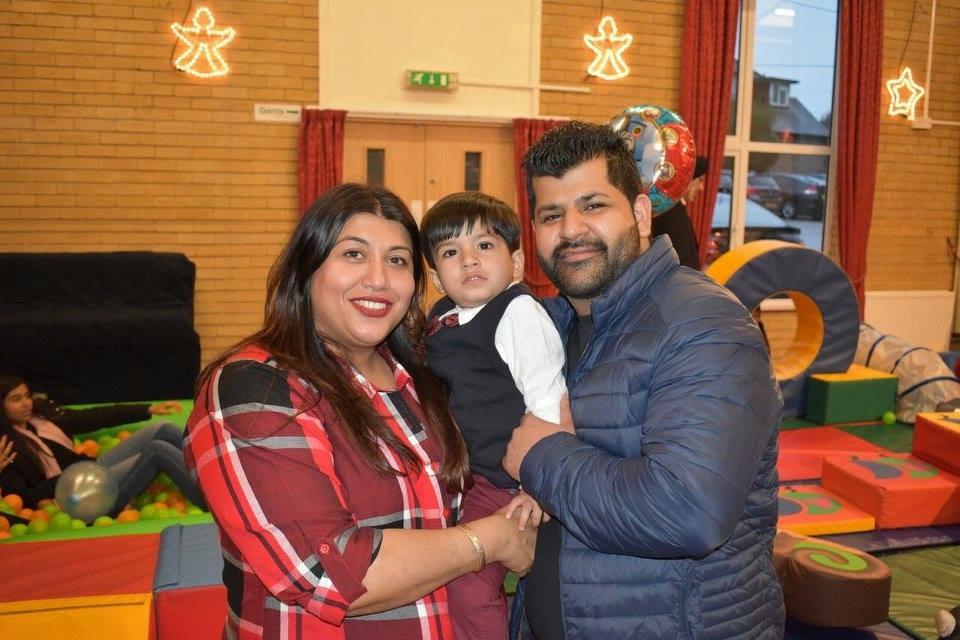Government 'understating' extent of Sure Start children's centre closures as thousands of families lose 'vital' support
As many as 1,000 'life-saving' Sure Start centres for young children and families have closed across UK since 2009 – twice as many as the government has reported, warn academics

Your support helps us to tell the story
From reproductive rights to climate change to Big Tech, The Independent is on the ground when the story is developing. Whether it's investigating the financials of Elon Musk's pro-Trump PAC or producing our latest documentary, 'The A Word', which shines a light on the American women fighting for reproductive rights, we know how important it is to parse out the facts from the messaging.
At such a critical moment in US history, we need reporters on the ground. Your donation allows us to keep sending journalists to speak to both sides of the story.
The Independent is trusted by Americans across the entire political spectrum. And unlike many other quality news outlets, we choose not to lock Americans out of our reporting and analysis with paywalls. We believe quality journalism should be available to everyone, paid for by those who can afford it.
Your support makes all the difference.The government is understating the rate at which Sure Start children’s centres are closing as thousands of families across the UK lose out on vital support, according to a new report.
Research by a team of academics from the University of Oxford shows that as many as 1,000 Sure Start centres across the country have closed since 2009 – twice as many as the government has reported.
The report warns that closures are creating a “postcode lottery” of early years provision, warning that the children’s centre programme is now at a “tipping point”, with more authorities preparing to make drastic cuts this year.
The national database recorded a 14 per cent drop in centre numbers between 2009 and October 2017, but the findings indicate that this understates the true figure, as a large number of “linked sites” were counted by some authorities but not by others.
When only counting “registered centres”, the drop since 2009 was more than 30 per cent, the report states, suggesting that more than 1,000 centres nationally might have closed.
According to the study, services have been “hollowed out” and are often no longer “in pram-pushing distance”, with the focus on centres changing to families that have been referred as “high need”.
It comes at a time when local authorities, faced with funding cuts, are struggling to provide support for vulnerable children and families, with many left with no option but to close services designed to detect early signs of child neglect and abuse – forcing them to direct to a “crisis” firefighting model.
It emerged earlier this week that spending on children and young people’s services has been axed by nearly £1bn in real terms over the past six years, prompting concerns that thousands of families are missing out on “lifeline” support.
The Sure Start children’s centre programme, introduced in 1998 by the last Labour government, brought together “under one roof” services for young children and their families. Focused initially on the most disadvantaged areas in England, the programme was later extended to all areas.
By its peak in August 2009, there were 3,632 centres, with more than half (54 per cent) in the 30 per cent most disadvantaged areas. However, in recent years, its status as a key national programme has diminished amid substantial budget cuts, the suspension of Ofsted inspections and increasingly uneven local provision.
Alka Dass, a mother of one from High Wycombe, told The Independent Sure Start was a “lifesaver” for her after she gave birth to her child just two weeks after her mother died at the end of 2015.

“Sure Start has been a massive lifeline for me. When I had my son my mum had died two weeks before, so it was hard not having her around and my family was going through a lot of grief. Having a child you can feel quite isolated anyway, so it was tough,” she said.
“But I started going to the children’s centre on a weekly basis – it was a real lifesaver. My confidence started building, I started attending different sessions. It’s good for your mental health and keeping everything in check. I would be very lost without it.
“Speech therapists who came in on an informal basis worked with my son, who has delayed speech. It’s really built his confidence, and going to the centre has helped develop his social skills through meeting lots of other children.”
Ms Dass, who is working with other parents on a campaign to end the closure of children’s centres, which will include a march to Downing Street next month, said Sure Start is a preventative model that helps families avoid reaching crisis point, by simply giving parents a support network in their community.
“The centres are in walking distance and anyone can use them. It’s much easier for a mum to walk into a children’s centre setting than call up a social worker. You just knock on their door and you know they will welcome you. There are staff who are trained when you’re going through a tough time,” she said.
“One woman recently said the centre helped her from suicide. It’s preventative support – these centres help to prevent family problems from escalating by just talking about what’s going on. As they close, the stress on GP surgeries and mental health services will increase.”
The report finds big regional variation in the extent of closures, with 16 authorities who had closed more than half of their centres accounting for 55 per cent of the total number of closures by 2017.
But in areas with fewer closures there’s been a reduction of services and staff, leading to fewer open access services such as Stay and Play and more parents having to rely on public transport to find a centre offering what they need.
Tracy Brabin MP, the shadow early years minister, said: “Sure Start provides support and education for families who need it most, yet as this report shows, Conservative cuts have created a postcode lottery in Sure Start provision.
Liberal Democrat education spokesperson and MP for Oxford West and Abingdon, Layla Moran, said: "I saw every one of the children’s centres in my constituency close in the year before I became an MP and I know what a devastating impact that has had for some vulnerable local families.
"This report provides yet more evidence that the Government must act to stem this tide of closures."
To stop the closure of centres and restore a sense of purpose, the Sutton Trust is calling on the government to complete the long-promised review of the children’s centre programme, as well as maintaining a national register of children’s centres to establish minimum levels of provision.
Sir Peter Lampl, founder of the trust, said: “Good quality early years provision makes a substantial difference in the development of children especially those who come from the poorest homes.
“It is a serious issue that the services that Sure Start centres offer are much more thinly spread than they were a decade ago. Additionally, since 2010 there has been a precipitous decline of 30 per cent in the number of Sure Start centres. Thousands of families are missing out on the vital support they provide.
“The government should complete its long-promised review of the programme. Instead of trying to serve all age groups, children’s centres should reconnect with their original purpose of promoting child and family development for the 0-5 age group.”
Professor Kathy Sylva, lead author of the report, said: “Our national survey of local authorities found wide variation in level of closures and in number of services on offer. This is all the more alarming in light of the government’s own evaluation of Sure Start showing many beneficial effects of children’s centre use on families.
“At a time of increasing pressure on poor families with young children, there is an urgent need for evidence based services to support them.”
A government spokesperson said: “Councils will receive more than £200 billion for local services, including children and young people services, up to 2019-20. In addition to this we are investing more in childcare support than any other government – around £6 billion a year by 2019/20.
“It is right that we give councils the freedom to decide what services they provide for their communities as they are best placed to understand local needs and how best to meet them, whether through a children’s centre building, a family hub, or another model.”
Join our commenting forum
Join thought-provoking conversations, follow other Independent readers and see their replies
Comments